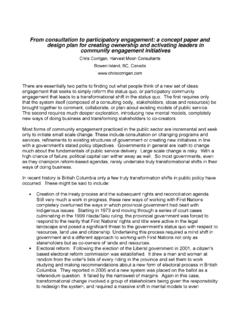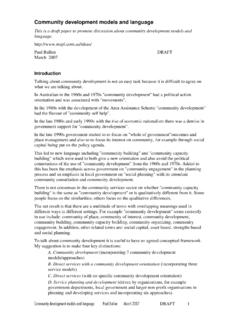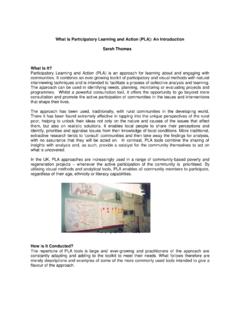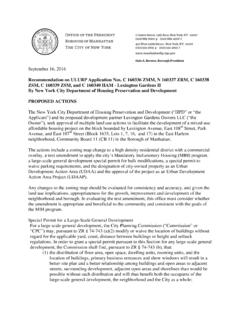Transcription of Community Radio Broadcasting
1 Community Radio BroadcastingCodes of Practice 23 October 2008 Introduction1a. Background1b. Guiding principles2c. Legal obligations2d. Australian Communications and Media Authority (ACMA)2e. Sector organisations3 Code 1: Our responsibilities in Broadcasting to meet Community interest4 Code 2: Principles of diversity and independence5 Code 3: General programming6 Code 4: Indigenous programming8 Code 5: Australian music9 Code 6: Sponsorship10 Code 7: Complaints11 Code 8: Codes of Practice review12 Appendices: appendices attached to the Codes are for guidance only and do not form part of the Codes1: Codes of Practice checklist132: Codes of Practice on-air announcement example193: Rights and responsibilities of volunteers example204.
2 Procedures for disciplinary action and dismissal of volunteers example235: Reporting suicide and mental health resources266: Music policy example277: Sponsorship policy example288: Complaints policy example29 Contents 1 A BackgroundCommunity Broadcasting plays a vital role in Australia as a unique sector operating together with commer-cial broadcasters and national broadcasters such as the Australian Broadcasting Corporation (ABC) and the Special Broadcasting Service (SBS). The sector actively promotes Community access and participation and volunteers are largely responsible for the operations of Community Broadcasting stations.
3 The stations vary sig-nificantly depending on the audience and Community interest they serve. These stations include those focus-ing on particular geographic areas, Indigenous, ethnic, Radio for the Print Handicapped, religious, gay and les-bian, and youth, as a few Broadcasting Services Act 1992 (the Act) outlines the legal framework for Community Broadcasting and explains the role the sector plays in delivering diverse media services that reflect a sense of Australian iden-tity, character and cultural diversity. The Community Radio Codes of Practice (the Codes) set out the guiding principles and policies for programming on Community Broadcasting stations.
4 They also outline the operational standards for stations that hold a Community broad-casting licence. The Codes do not replace the licence conditions in the Act; they are complementary and we are legally obliged to follow both the licence conditions and the Section 123 of the Act, industry groups must develop the Codes in consultation with the Australian Communications and Media Authority. The Codes may cover programming requirements, fairness and accu-racy in news and current affairs reporting, complaints handling and sponsorship, among other matters.
5 The Codes outline that the sector organisation represent-ing the majority of licensees will be responsible for co-ordinating a review of the Codes. As such, during 2008 the Community Broadcasting Association of Australia (CBAA) coordinated the review : Appendices attached to the Codes are for guid-ance only and do not form part of the Guiding principlesCommunity broadcasters are united by six guid-ing principles. We will work to:nPromote harmony and diversity and contribute to an inclusive, cohesive and culturally-diverse Australian communityn Pursue the principles of democracy, access and equity, especially for people and issues not adequately represented in other median Enhance the diversity of programming choices available to the public and present programs that expand the variety of viewpoints broadcast in AustralianDemonstrate independence in programming as well as in editorial and management decisionsn Support and develop local arts and musicnIncrease Community involvement in the Codes.
6 Community Broadcasting li-censees are referred to as we or our . The terms are le-gally of Practice 1 2 Community Radio Broadcasting Codes of Practice C Legal obligationsEach Community Broadcasting station has legal obli-gations that relate to programming and station opera-tions. The Broadcasting Services Act 1992 (the Act) outlines a number of licence conditions and some program standards that apply to all provisions in the Act require Community broadcasters to:nprovide Community Broadcasting services for the benefit of the Community and not operate them to make a profit,ncontinue to represent the Community interest that it represented when the licence was allocated or last renewed, although a licensee can apply to change that Community interest at renewal,nencourage Community access and participation in all aspects of station operations, from programming to management, andnonly broadcast sponsorship announcements, rather than advertising.
7 Which total no more than five minutes in any hour of Australian Communications and Media Authority (ACMA)The Broadcasting regulator, the Australian Communica-tions and Media Authority (ACMA), is responsible for en-suring that Community Broadcasting stations meet the licence conditions in the Act and requirements outlined in the other key responsibilities of ACMA are to:nPromote a system whereby broadcasters take responsibility for making sure they meet the licence conditions and the requirements in the Codes,nMake sure that electronic media maintain Community standards,nManage spectrum allocation and make sure that a range of media services is provided in all areas, andnAdminister the licence allocations and renewals process, including for temporary Community Broadcasting investigates complaints made on issues relating to licence conditions or the Codes.
8 The complaints pro-cedure is detailed in Code 7. The order in which com-plaints are dealt with is outlined in the following table: 3 Type of complaint:Steps in handling complaintA station s choice of programmingStation s responsibility according to its policies and procedures under Code 2 or among station volunteers and membersStation s responsibility according to its policies and procedures under Code 1. Sector organisations may be able to provide some conflict resolutionStation s responsibility according to its policies and procedures under Code 1. Sector organisa-tions may be able to provide some management or constitution mattersConsult the State or Territory Office of Fair Trading or Consumer Affairs Department.
9 Sector organisations may be able to provide some claims against stationSeek own legal further information on Community Broadcasting , see ACMA s website: Sector organisationsCommunity Broadcasting organisations exist to provide support and advice to their members. They include national, state and regionally-based organisations and those focused on special interests or communities. These organisations also work to influence the regu-latory environment through lobbying, advocacy and briefing of these sector organisations regulates commu-nity Broadcasting .
10 They have no legal role to play in monitoring complaints, solving disputes or ensuring that Community broadcasters meet their legal obliga-tions. However, collectively they contribute information and ideas to the Codes of Practice review, in consulta-tion with ACMA, and may assist stations to meet their legal list of current membership-based Community broad-casting sector organisations can be found at Community Radio Broadcasting Codes of Practice Code: 1 Purpose:Our responsibilities in Broadcasting to meet our Community interestTo make sure that Community Radio stations operate according to the guiding principles and within a framework of sound corporate Community Radio station will be controlled and operated by an independent body that represents its Community will have in place written corporate governance policies and procedures that support management, financial.








